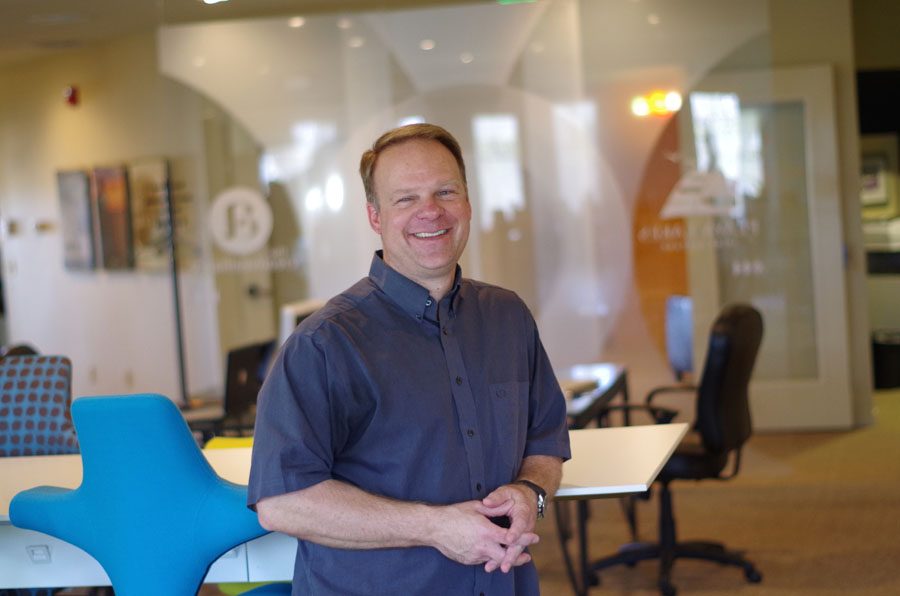Why do Teachers leave the Profession?
A Q&A with former English Teacher Mr. Ace Van Wanseele about his decision to leave teaching
Photo courtesy of Mr. Ace Van Wanseele
Mr. Ace Van Wanseele taught English at RV for five years prior to returning to the private sector to work for The Creative Alliance.
December 7, 2016
What was your first career interest coming out of college?
I doubled majored in psychology and English and thought I might teach, but that would have required more schooling and more debt. Ended up accepting a position doing graphic design and customer service.
At that time, early in your career, did you ever think you would end up in the teaching profession?
Working with people and seeing them learn new things is cool. I’ve always liked being a part of that process. In various professional roles over the years, I authored curriculum, developed assessments, delivered classroom training and monitored results in corporate environments. I was a trainer, a professional teacher, if you will.
What was the reasoning for you leaving the private sector to become a teacher?
The internet company I worked for went out of business in December, 2008, and everyone in my company — not to mention plenty of others at that time around the nation — was out of work. That was the “dot bomb” series of events. I wanted to continue being a trainer and researched working in school districts. After observing multiple classrooms around my home and researching various districts, I decided to pursue that path. At that time, most districts offered some sort of salary acknowledgement for prior work experience. I earned an MA and teaching credential by attending grad school full time and started job hunting that following summer.
Where did you start your teaching career and how did you end up at Ralston Valley?
I taught at Brighton High School for one year as part of their alternative licensure program. That was a temp position and ended the following May. In August, 2010, I applied for and was offered a .06 vacancy at RV which was also a temporary contract. Jeffco was in the midst of financial discussions and had removed the salary placement based on prior non-teaching experience so I was a first-year teacher at 38 years old. Our son was in middle school and my family decided that having the holidays and summers off was advantageous. At the end of that school year, the contract ended and I applied for another opening in the RV English department, along with others at various high schools. The 2011-2012 contract position was offer, I accepted, and was ecstatic to be back. RV was home. I loved my classes, my colleagues and the school. The kids were driven, focused, caring, considerate and motivated.
However, I was still a probationary teacher on a temporary contract and there was a reduction in the pay scale district-wide. In March, 2012, an English position again opened to external applicants, I applied and was offered a permanent position for the following school year. Unfortunately. Jeffco’s board was unsettled and the customary salary increases were frozen.

After your years at RV, why did you decide to leave the teaching profession?
Tough decision. I taught at RV for five awesome years. A friend mentioned an account manager position at a local marketing agency that I accepted in the summer of 2015. Our son was now a junior in high school and the need to have shared holidays off wasn’t as necessary. The pay increase was helpful for my family, too, especially since our son is soon to be in college.
How has the transition been from teaching back to the private sector?
It’s a different world. Different pressures, different expectations, different triumphs. The clients I work with now are varied and I embrace the challenges of growing their businesses. The coolest thing is that all of the lessons and assignments we completed in class are so very applicable to the real world. Effective writing and communication skills (I consider POINT-EVIDENCE-ANALYSIS daily!), rhetorical devices, logical fallacies, persuasion, ethics and integrity, critical thinking — these are the skills that employers seek and need.
What do you miss most about teaching?
The people. The extraordinary people at RV – students, faculty, administration. Dedicated and thoughtful. Full of promise.
What do you miss least about teaching?
Prepping sub plans. (If you’re not a teacher, you may not understand.)
Statistically, nearly 20 percent of teachers do not make it past four years of teaching. Why do you think this is the case? What can be done in the world of education to keep more people in the teaching profession?
I wonder if this differs for other professions? Teaching requires a very particular set of skills. It’s certainly not for everyone; I always felt a sense of pride telling people that I was a high school teacher. And I am proud to have taught and am fortunate to have been able to work at RV specifically.
What are your current thoughts about the state of education in the United States? What are we doing right? What do we need to do differently?
I wonder about painting with too broad of strokes because it is such a massive system. With any initiative that spans a spectrum so great, there are positives and negatives. Everyone is or has been in school at some point. There’s a lot to be praised. I can’t recall any teachers who were lazy or inadequate. Rather, I found most to be passionate about doing right by their students, about being energetic and driven, about staying focused on improving their educations.
Everything being equal, particularly the pay, would you still be a teacher?
I’ve often said that if we won the lottery, I would hustle back to the classroom. And we’re still playing Powerball.


